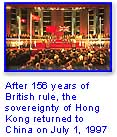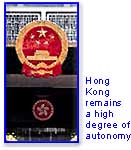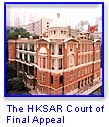
On July 1 1997, Hong Kong, the world's eighth-largest trading entity, became a Special Administrative Region (SAR) of the People's Republic of China from a Dependent Territory of Britain.

Hong Kong's legal system is firmly based on the rule of Basic Law which guarantees a high degree of autonomy under the concepts of 'One Country, Two Systems' and 'Hong Kong people running Hong Kong'. This Constitutional document guarantees the future of Hong Kong. Hong Kong is running smoothly since 1 July 1997.
The important terms in the Basic Law:
 Hong Kong will retain its capitalist system and way of life for at least 50 years.
Hong Kong will retain its capitalist system and way of life for at least 50 years.
 Hong Kong will enjoy a high degree of autonomy. It has its own executive, legislative and independent judicial power, including that of final adjudication.
Hong Kong will enjoy a high degree of autonomy. It has its own executive, legislative and independent judicial power, including that of final adjudication.
 Chinese and English are the official languages.
Chinese and English are the official languages.
 Hong Kong Dollar as the official currency and remains freely convertible.
Hong Kong Dollar as the official currency and remains freely convertible.
 HKSAR remains an international financial centre, a free port and a separate customs territory.
HKSAR remains an international financial centre, a free port and a separate customs territory.
 HKSAR will govern its own finances, trade, economy, external commercial relations and all other matters, except for defense and foreign affairs.
HKSAR will govern its own finances, trade, economy, external commercial relations and all other matters, except for defense and foreign affairs.

 HKSAR remains a separate member of international organisations not limited to states, such as the WTO, World Customs Organization, and APEC.
HKSAR remains a separate member of international organisations not limited to states, such as the WTO, World Customs Organization, and APEC.
 Hong Kong may on its own, using the name 'Hong Kong, China', maintain and develop relations and conclude and implement agreements with foreign states and regions.
Hong Kong may on its own, using the name 'Hong Kong, China', maintain and develop relations and conclude and implement agreements with foreign states and regions.
 The Common Law system will be maintained.
The Common Law system will be maintained.
 Hong Kong will maintain its own shipping registry.
Hong Kong will maintain its own shipping registry.
 Basic rights and freedoms of Hong Kong residents, including freedom of speech, the press and of association are safeguarded, along with the right to private ownership of property.
Basic rights and freedoms of Hong Kong residents, including freedom of speech, the press and of association are safeguarded, along with the right to private ownership of property.
 Religious, academic, literary and artistic freedoms continue.
Religious, academic, literary and artistic freedoms continue.

